The SSD Relapse: Understanding and Choosing the Best SSD
by Anand Lal Shimpi on August 30, 2009 12:00 AM EST- Posted in
- Storage
All Indilinx Drives Are Built Alike
G.Skill, OCZ, Super Talent and Patriot all sent their Indilinx MLC drives in for review. If you take the drives apart you see that most are the very same on the inside, despite differences externally:
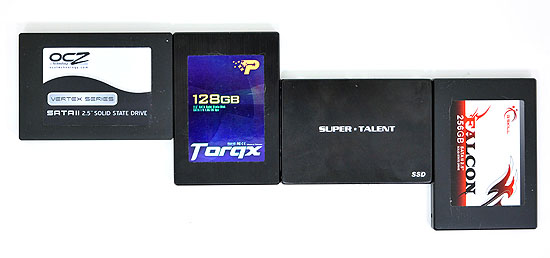
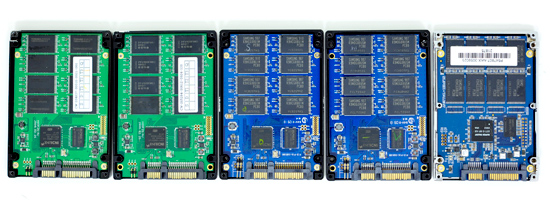
From Left to Right: OCZ Vertex Turbo, OCZ Agility, Patriot Torqx, G.Skill Falcon and Super Talent UltraDrive GX. Only the Super Talent drive uses a different PCB design.
Even the packaging doesn’t appear to vary much between manufacturers; that part I don’t really understand. All that seems to change is the artwork on the outside.
There are some minor differences between drives. Patriot ships its Torqx with a 2.5” to 3.5” drive bay adapter, a nice addition. The Torqx also comes with a 10 year warranty, the longest of any Indilinx based manufacturer. OCZ is next with a 3 year warranty, followed by Super Talent and G.Skill at 2 years.
Indilinx is still a very small company so it relies on its customers to help with validation, testing and even provide feedback for firmware development. As far as I can tell, every single Indilinx customer gets the same firmware revisions. Some vendors choose to rename the firmware revisions, while others do not. OCZ calls its latest stable firmware 1.30, while G.Skill, Super Talent and Patriot call it 1571.
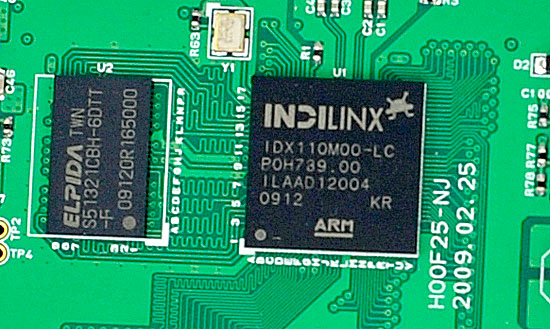
The Indilinx Barefoot controller (right), powered by an ARM core.
Of all the Indilinxites, OCZ and Super Talent work closest with the controller manufacturer. In exchange for their help in manufacturing and validation, OCZ and Super Talent also get access to the latest firmwares earlier than the rest of the manufacturers. Ultimately all manufacturers will get access to the same firmware, it just takes longer if you’re not OCZ or Super Talent.
You no longer need to use a jumper to upgrade your firmware, provided that you’re already running fw revision 1275 or later. If you have a previous version you’re pretty much out of luck as you need to upgrade to 1275 first before upgrading to anything else, and none of the manufacturers make it easy to do. Some don’t even offer links to the necessary firmware you’d need to jump to 1275. Thankfully pretty much anything you buy today should come nearly up to date, so this mostly impacts the original customers of the drive.
Performance, as you’d expect, is the same regardless of manufacturer:
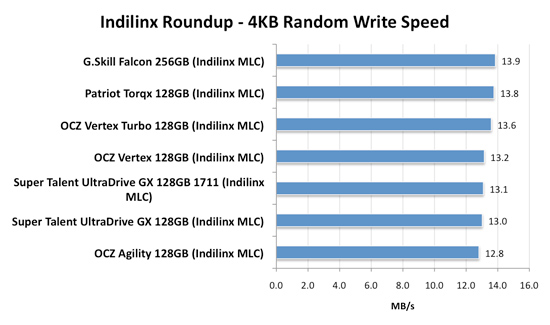
There's normal variance between drives depending on the flash/controller, that's why the OCZ Vertex is slower than the Patriot Torqx here but faster than the Super Talent UltraDrive GX. The manufacturer and size of the flash has more to do with determining performance. Samsung is used on all of these drives but the larger the drive, the better the performance. The 256GB model here will always be faster than a 128GB drive, which will always be faster than a 64GB, etc...
All of the drives here use the same firmware (1571) except for one of the Super Talent drives. That drive is using the beta 1711 firmware with TRIM support that was pulled.
When it comes to the best overall package, I’d say Patriot’s Torqx is the nicest for a desktop customer. You get a 3.5” adapter bracket and a 10 year warranty (although it’s difficult to predict what Patriot’s replacement strategy will be in 10 years).
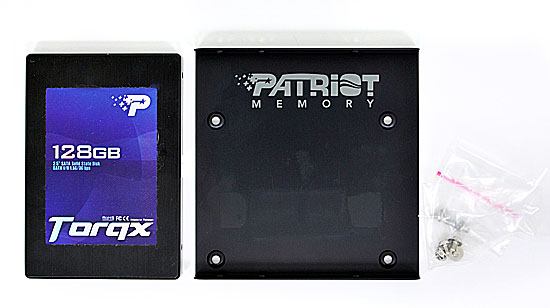
The Patriot Torqx bundle, complete with a 2.5" to 3.5" adapter.
Prices vary a bit between manufacturers, although most of the more expensive drives here have a $30 rebate to bring their prices in line:
| Price for 128GB | |
| Corsair Extreme Series | $384.00 |
| OCZ Agility | $329.00 |
| OCZ Vertex | $369.00 |
| OCZ Vertex Turbo | $439.00 |
| Patriot Torqx | $354.99 |
OCZ does do some unique things that the other manufacturers don’t such as deliver an overclocked drive (Turbo) and a drive with slower flash (Agility). There’s a Mac Edition of the Vertex, unfortunately it’s no different than the regular drive - it just has a different sticker on it and a higher pricetag.










295 Comments
View All Comments
sunbear - Monday, August 31, 2009 - link
Even though most laptops are now SATA-300 compatible, the majority are not able to actually exceed SATA-150 transfer speeds according to some people who have tried. I would imagine that sequential read/write performance would be important for swap but the SATA-150 will be the limiting factor for any of the SSD's mentioned in Anand's article in this case.Here's the situation with Thinkpads:
http://blogs.technet.com/keithcombs/archive/2008/1...">http://blogs.technet.com/keithcombs/arc...vo-think...
The new MacBookPro is also limited to SATA-150.
smartins - Tuesday, September 1, 2009 - link
Actually, The ThinkPad T500/T400/W500 are fully SATA-300 compatible, it's only the drives that ship with the machines that are SATA-150 capped.I have a Corsair P64 on my T500 and get an average of 180MB/read which is consistent with all the reviews of this drive.
mczak - Monday, August 31, 2009 - link
article says you shouldn't expect it soon, but I don't think so. Several dealers already list it, though not exactly in stock (http://ht4u.net/preisvergleich/a444071.html)">http://ht4u.net/preisvergleich/a444071.html). Price tag, to say it nicely, is a bit steep though.Seramics - Monday, August 31, 2009 - link
Another great articles from Anandtech. Kudos guys at AT, ur my no. 1 hardware site! Anyway, its really great that we have a really viable competitor to Intel- Indilinx. They really deserve the praise. Now we can buy a non Intel SSD and have no nonsensical stuttering issue! Overall, Intel is still leader but its completely nonsensical how bad their sequential write speed is! I mean, its even slower than a mechanical hard disk! Thats juz not acceptable given the gap in performance is so large and Intel SSD's actually can suffer a significantly worst performance in real world when sequential write speed performance matters. Intel, fix your seq write speed nonsence please!Seramics - Monday, August 31, 2009 - link
Sorry for double post. Its unintentional and i duno how to delete the 2nd post.Seramics - Monday, August 31, 2009 - link
Another great articles from Anandtech. Kudos guys at AT, ur my no. 1 hardware site! Anyway, its really great that we have a really viable competitor to Intel- Indilinx. They really deserve the praise. Now we can buy a non Intel SSD and have no nonsensical stuttering issue! Overall, Intel is still leader but its completely nonsensical how bad their sequential write speed is! I mean, its even slower than a mechanical hard disk! Thats juz not acceptable given the gap in performance is so large and Intel SSD's actually can suffer a significantly worst performance in real world when sequential write speed performance matters. Intel, fix your seq write speed nonsence please!Shadowmaster625 - Monday, August 31, 2009 - link
Subtle. Very subtle. Good article though.3 questions:
1. Is there any way to read the individual page history off the SSD device so I can construct a WinDirStat style graphical representation of the remaining expected life of the flash? Or better yet is there already a program that does this?
2. Suppose I had a 2 gigabyte movie file on my 60gb vertex drive. And suppose I had 40GB of free space. If I were to make 20 copies of that movie file, then delete them all, would that be the same as running Wiper?
3. Any guesses as to which of these drives will perform best when we make the move to SATA-III?
4. (Bonus) What is stopping Intel from buying Indilinx (and pulling their plug)? (Or just pulling their plug without buying them...)
SRSpod - Thursday, September 3, 2009 - link
3. These drives will perform just as they do now when connected to a 6 GBps SATA controller. In order to communicate at the higher speed, both the drive and the controller need to support it. So you'll need new 6 GBps drives to connect to your 6 GBps controller before you'll see any benefit from the new interface.heulenwolf - Monday, August 31, 2009 - link
Yeah, once the technology matures a little more and drives become more commoditized, I'd like to see more features in terms of feedback on drive life, reliability, etc. When I got my refurb Samsung drives from Dell, for example, they could have been on the verge of dying or they could have been almost new. There's no telling. The controller could know exactly where the drive stands, however. Some kind of controller-tracked indication of drive life left would be a feature that might distinguish comparable drives from one another in a crowded marketplace.While they're at it, a tool to allow adjusting of values such as the amount of space not reported to the OS with output in terms of write amplification and predicted drive life would be really nifty.
Sure, its over the top, but we can always hope.
nemitech - Monday, August 31, 2009 - link
I picked up an Agility 120 Gb for $234 last week from ebay ($270 list price - - 6% bing cashback - $20 pay pal discount). I am sure there will be similar deals around black Friday. $2 per Gb is possible for a good SSD.